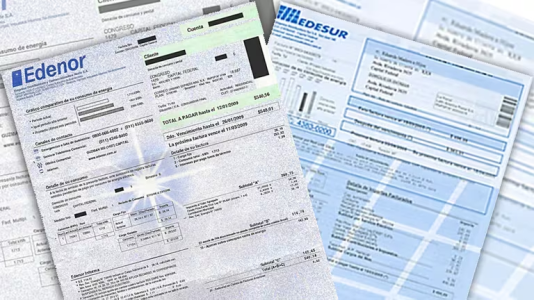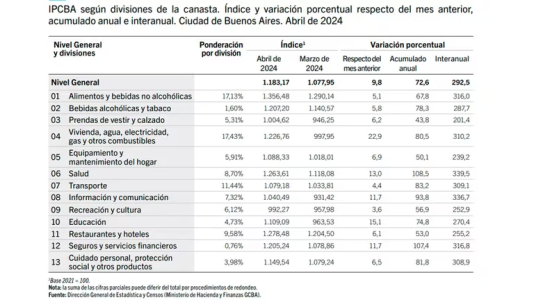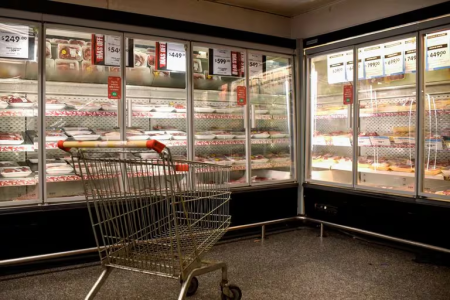All the Answers
Well-known member
Buenos Aires inflation was 9.8% in April and rose to 292.5% in the last year - Infobae

Source:

La inflación porteña fue del 9,8% en abril y ascendió a 292,5% en el último año
Fue el primer índice de un dígito mensual desde el cambio del Gobierno nacional; el mes pasado hubo una fuerte suba en los rubros de la vivienda por la suba de las tarifas y de la salud por la medicina prepaga; qué pasó con los alimentos en el registro de la Ciudad
May 08, 2024
It was the first monthly single-digit index since the change of the national government; Last month there was a strong increase in the housing items due to the increase in rates and in health due to prepaid medicine; What happened to the food in the City registry
By Martin Kanenguiser

Sharp increase in rates
Buenos Aires inflation reached 9.8% in April, 72.6% since January and 292.5% in the last year, with food above the general average. This is the first monthly single-digit index recorded since the change of national government last December.
The General Directorate of Statistics and Censuses of the City of Buenos Aires released the Consumer Price Index (IPCBA), whose increase last month “responded fundamentally to the increases in the following divisions: Housing, water, electricity, gas and other fuels, Health, Food and non-alcoholic beverages, Information and communication and Restaurants and hotels.” These items “explained 75% of the increase in the General Level.”
María Eugenia Lago , head of the organization, expressed that there is “a constant decrease in the inflation rate in the City from the 21.1% observed in December 2023. April is the fourth consecutive month of decline in the index, which is located at single digit for the first time since July of last year.”
A constant decrease in the inflation rate is observed in the City from the 21.1% observed in December 2023. April is the fourth consecutive month of decline in the index, which is in single digits for the first time since July of last year ( María Eugenia Lago)
“It is important data because the index reflects a downward trend. However, the increase in some items, mainly those linked to public service, transportation and food rates, maintains pressure on measurements,” clarified the Buenos Aires government official.

month, accumulated annually and interannual. Buenos aires city. April 2024
Last month, the largest increase corresponded to the category of Housing, water, electricity, gas and other fuels, which averaged an increase of 22.9%, contributing 3.7 percentage points to the monthly increase in the IPCBA. This was based “mainly on increases in residential rates for network water and natural gas supply services.”
In second place was education due to the sharp increase in fees for private schools in Buenos Aires.
Then the health category was located with 13% due to the increase in prepaid medicine fees, which were limited by the Government to the increase in the consumer price index (CPI) of Indec. Due to this decision, a smaller increase in this segment should be observed in May.
In fourth place was the information and communication sector with 11.7% due to the increase in internet and cell phone subscriptions.
Meanwhile, the sensitive category of Food and non-alcoholic beverages showed an increase of 5.1% last month and 316% in the last year.
In particular, “the main impulses came from Milk, dairy products and eggs (9.5%), Meats and derivatives (5.9%), Vegetables, tubers and legumes (10.5%) and Bread and cereals (3. 5%).
On the other hand, the Restaurants and hotels sector increased 6.1%, "as a result of increases in the prices of food prepared in restaurants, bars and eateries."

María Eugenia Lago, director of Buenos Aires statistics
On the other hand, there was a drop “in hotel accommodation service rates that contributed to slowing the division's rise.”
Regarding inflation last year, “the Food and non-alcoholic beverages, Housing, water, electricity, gas and other fuels, Transportation and Restaurants and hotels divisions were the main responsible for the increase in retail prices, explaining the 58. 9% of the interannual variation of the General Level.”
Goods and services
The Buenos Aires organization specified that "in the month of April, Goods registered an increase of 4.8%, below Services, which increased 13.8%."To a lesser extent, “the increases in prepaid medicine fees, in the prices of restaurants, bars and food houses and in the values of common housing expenses stood out.”
“ In the first four months of the year, Goods accumulated an increase of 61.8% and Services of 81.8%. In year-on-year terms, Goods slowed down their rate of increase to 305.5%, (-15 pp compared to the previous month), while Services accelerated to 283.1%, (+22.5 pp),” stated the report.
In the IPCBA, “the monthly dynamics of Goods responded fundamentally to increases in food prices (mainly dairy products, meats, vegetables and baked goods).”
“Next in importance were the increases in the prices of clothing, fuel and lubricants for vehicles for household use, medicines and automobiles.”

The price of food rose 316% in one year REUTERS/Mariana Nedelcu
Meanwhile, the behavior of the Services mainly reflected “the adjustments in residential rates for the network water and natural gas supply service. To a lesser extent, the increases in prepaid medicine fees, in the prices of restaurants, bars and food houses and in the values of common housing expenses stood out.
In addition, it was specified that in April "the Resto IPCBA group - proxy for core inflation - averaged an increase of 7.4% and in year-on-year terms, it slowed down to 287.9%."
“The Regulated group increased 23%, highlighting the updates in residential rates for the network water and natural gas supply service. Next in importance were the adjustments in the fees for prepaid medicine and educational establishments (initial, primary and secondary level).” In this way, “it accelerated its rate of increase to 373.4% year-on-year (+72.6 pp).”
Furthermore, he indicated that “Seasonal goods and services averaged an increase of 2.2%, as a result of opposing behaviors: increases in the prices of clothing and vegetables, which were partially offset by falls in the values of tourist services (hotel accommodation and vacation packages).” In year-on-year terms, “this aggregate slowed down to 204.9% year-on-year.”
Next week the Indec data will be known, which, according to the Government, will also be in single digits, around 9% (it has a lower weight of services than CABA) and very close to 300% annually, leaving one once again the tallest in the world.

